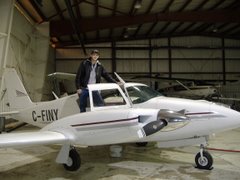Flying is certainly a very specialized skill. But it is unique in that in that very specialized activity of commanding an aircraft, a very broad area of other skills and education is required. Even more so many of these skills are more then basically covered. Academically a pilot is taught and must understand (for the most part) applied physics which includes aerodynamics, meteorology which could in some cases be described as fluid dynamics. There is also mechanics/engineering, practical mathematics, geography & navigation, communication, and even psychology. Flying is even a study of art. What can show more self expression and skill then massaging an aircraft down for a "picture" perfect landing, or an aerobatic pilot making the sky his canvas?
It has also been long recognized that many valuable life skills can be taken away from inside the airplane. Pilots learn good decision making, hand-eye coordination, critical thinking, safety consciousness and the importance of being prepared. Much of the hands on life skills are easy to understand, but much of what is taught academically to a pilot can be very easily taken for granted. Much of what pilot's are taught is geared towards some sort of practical application, but in many cases the practical application can only make sense after the theory is understood.
Groundschool even for Private Pilots include almost every aerodynamic scenario an aircraft will encounter. Did you know that during a climbing turn an aircraft's inside wing is experiencing different aerodynamics then an aircraft's outside wing? Aerodynamics in a descending turn are different still. The theory behind radio waves is covered as well. In the meteorology side of things, would-be pilots are taught everything from the theory behind cloud formation and predicting what altitude they will form at, to the intimate differences of the weather at a warm front versus a cold front.
Pilot's are also expected to be able to perform on-the-fly (pardon the pun) mental calculations. One excercise, diversions, requires a student to map out a previously unplanned route to a new destination, accurately estimate the distance, calculate the heading to fly, the time it takes to get there, and a halfway point - using only a map and a pencil, while flying the aircraft! That can take some mental gymnastics when the mind is already occupied with flying.
Student pilot's even dabble in human behaviour. They learn the brain's natural decision making process and how our attitudes affect our decision making. They also study how human's communicate and how communication can often breakdown or be misinterpreted. Pilot's who will be working as part of a crew learn all about interpersonal dynamics and behavioural awareness.
Learning the skills of modern aviating is more then just air law, a bit of weather, and learning which buttons to press and how to manipulate the controls of an aircraft. The interesting thing about flying is that it draws from almost every major area of study out there. While a pilot's license won't give you a Phd in any subject, it is certainly an eye opener to the practicality of studying them.
I think sometimes I sell myself short to the skills and knowledge I've learned. The transferable skills gained from learning how to flying are countless. Aviation has taught me more then just how to fly a plane.
Monday, September 29, 2008
Subscribe to:
Comments (Atom)



